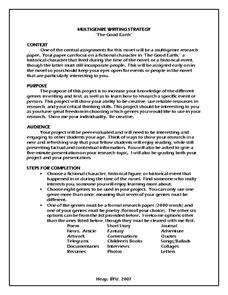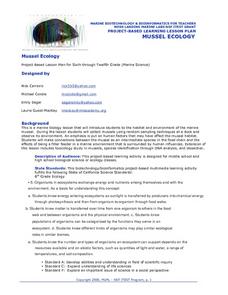University of Colorado
Spacecraft Speed
Space shuttles traveled around Earth at a speed of 17,500 miles per hour, way faster than trains, planes, or automobiles travel! In the 13th installment of 22, groups graph different speeds to show how quickly spacecraft move through...
University of Colorado
Are All Asteroids' Surfaces the Same Age?
Did you know scientists can tell the age of an asteroid by looking closely at its craters? This final instructional activity of a six-part series focuses on two asteroids, Gaspra and Ida, in order to demonstrate the concept of dating...
University of Texas
Multi-wavelength Astronomy
Explore a land far, far away with a well-designed lesson that examines electromagnetic imaging as a way to obtain information about galactic structures. Learners begin to see the importance of looking beyond the visual spectrum to reveal...
NASA
Revising an Investigation
Write, edit, and then revise! The fourth lesson in a five-part series asks peers to provide feedback on research. Individuals then use the research to edit and revise conclusions and develop their presentations.
Mascil Project
Design a Parking Garage
Parking structures don't build themselves. Investigate the process of designing and planning the construction of a parking garage. After considering the factors that must go into the design, scholars create their own models from a set of...
American Statistical Association
How Random Is the iPod’s Shuffle?
Shuffle the resource into your instructional activity repertoire. Scholars use randomly-generated iPod Shuffle playlists to develop ideas about randomness. They use a new set of playlists to confirm their ideas, and then decide whether...
Federal Judicial Center
Amistad and Dred Scott—a Comparative Activity
What do slaves fighting for their freedom on board a ship and a slave fighting for his freedom in a courtroom have in common? Budding historians investigate the two different cases of the Amistad slave revolt and the Dred Scott argument....
Carolina K-12
African Americans in the United States Congress During Reconstruction
The Civil Rights Act of 1866, which granted citizenship to all males in the U.S., resulted in the first African Americans to be elected to Congress. Class members research 11 of these men, the challenges they faced, and craft...
Stanford University
Chronology: Civil Rights in the 20th Century
Test pupils' knowlege of history and the way civil rights movements unfolded using a series of images. With a primary source analysis activity, scholars practice their chronology and deductive reasoning skills. They use their knowledge...
Curated OER
Illustrations in Report Writing
Students create a short report using all the steps in the writing process including a bibliography. They explore different pictures that relate to their topic and download an image for the internet into their report. A helpful rubric is...
Curated OER
What Do You Want To Be When You Grow Up?
Participate in authentic career research, and make effective and realistic career/academic choices entering high school. Develop communication skills, demonstrate English language arts proficiency, and share a group presentation with...
Curated OER
Publishing Stories: Beginning, Middle, End
First and second graders explore the importance of having a beginning, middle, and end when writing stories. In this story writing lesson, students write short stories using the story diamond as a guide. They invite their parents to an...
Novelinks
The Good Earth: Multigenre Writing Strategy
In response to reading Pearl Buck's The Good Earth, individuals are asked to complete a multi-genre writing assignment, crafting eight different pieces including a research paper.
Curated OER
Mussel Ecology
Students are introduced to the marine environment of the mussel. The emphasis of the lesson is upon what human factors are present to influence the environment in positive and negative ways. They brainstorm in groups in order to conduct...
Curated OER
A GREAT SPORT
Students explore how diverse groups and individuals have contributed to the cultural development of Canada, and then produce two-dimensional works of art.
Curated OER
Marine Animals on the Move
Students work with partners to track tagged animals using real-time data from satellites. Students gather and analyze data, compile information and conclusions and then prepare a final presentation of their research.
Curated OER
Baseball Anyone
Students explore the change in values from the 1920's to the present. In groups, students use the internet to analyze Pete Rose and gambling in sports. The 1919 scandal of the World Series is explored and discussed by students. They...
Curated OER
Relating Algebra to Geometry
Learners investigate the connection that exists between Algebra and Geometry. They classify two and three-dimensional figures. Pupils use formulas to solve problems in geometry and use appropriate measuring devices in the right contexts.
Curated OER
Photo/Mat Weaving
Students explore the art of mat weaving. In this tapestry lesson, students create maps with paper or photographs. Students understand age appropriate skills and technique of map weaving. Students learn the cultural aspects of map weaving.
Curated OER
FACS: Keys for Caregiving
Caregivers have the responsibility to meet the needs of those in their care. Prepare your class for a life as a child care worker with a lesson on the responsibilities needed to care for a child. They view a presentation on...
Curated OER
Comparing Mitosis with Meiosis
Life science learners view an online animated mini textbook comparing two types of cell division. Working in groups, they use a digital microscope to capture images of cells in different stages of mitosis and meiosis. Then they create an...
Curated OER
Literary Terms Used in I, Juan de Pareja
Seventh graders define six different literary terms after reading I, Juan de Pareja. In groups, they are given a specific literary term to create a PowerPoint presentation explaining how their term in utilized in the context of I, Juan...
Curated OER
Re-Presenting Race in the Digital Age
Teen-aged scientists analyze a graphic organizer of how trash is removed from New York City and then answer standard questions about a graph and a diagram. Resources are mentioned, but there are no links to these resources, so you will...
Curated OER
Using Harmonic Vision’s Music Ace Software to Reinforce Basic Music Skills
If you have access to Harmonic Vision’s Music Ace Software, then this instructional activity could work for you. Kindergarteners use the video music software to place, identify, and read musical notes. They listen in and identify both...

























